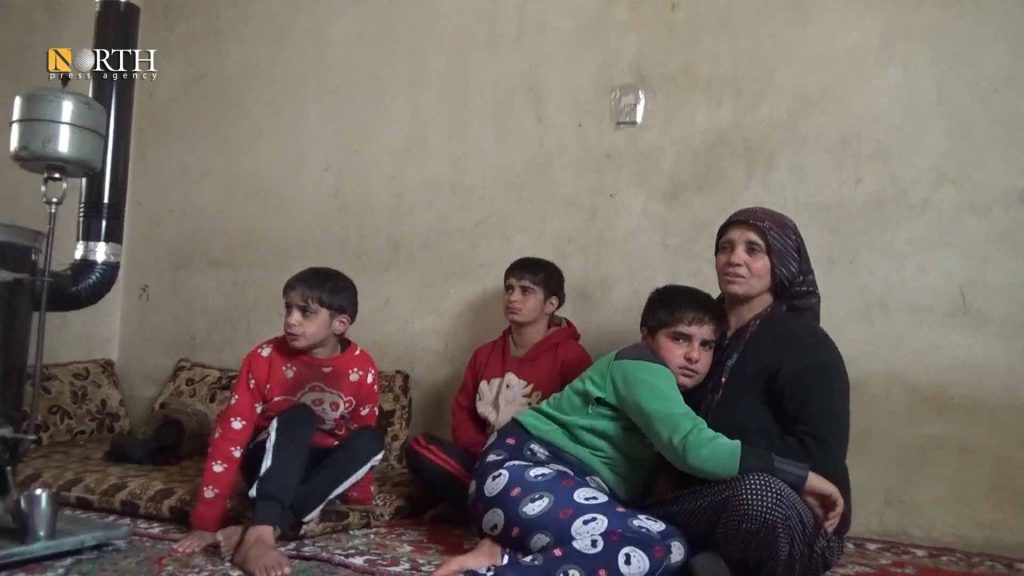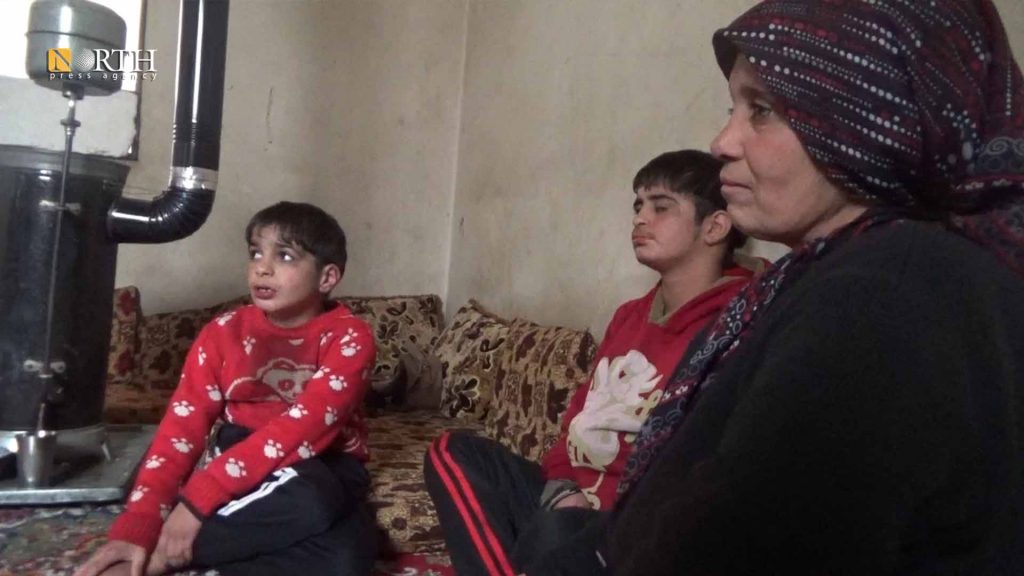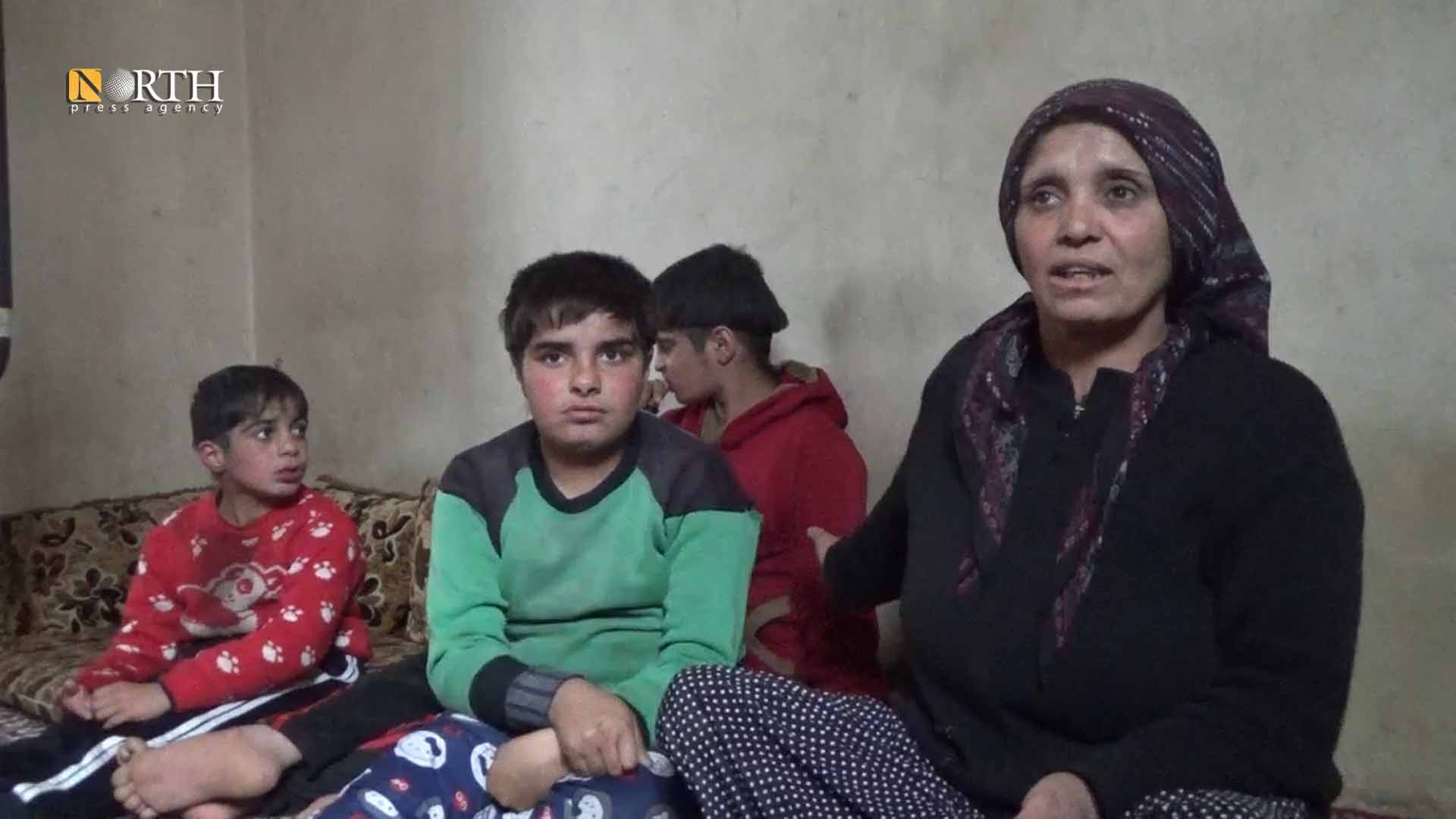IDP mother from Syria’s Afrin struggles for her three epileptic daughters
ALEPPO, Syria (North Press) – The 51-year old Elif Hussein makes sure that the door of the house where her family lives in the town of Tel Rifaat in the northern countryside of Aleppo, north Syria, is tightly closed, for fear that one of her epilepsy daughters will go out and harm herself.
The symptoms of epilepsy appeared since the first year in each of the three sisters, Haifa, 15, Salwa, 13 and Arifa, 12.
The family fled more than three and a half years ago from Afrin region during the invasion of Turkey and its backed-armed Syrian opposition factions, after about two months of battles with the Kurdish People’s Protection Units (YPG).

The Turkish military operation in 2018, caused the displacement of about 300,000 people from Afrin to live in the camps of al-Awda, Afrin, Barkhodan, Sardam and Shahba, while others were distributed among 42 villages and towns in the northern countryside of Aleppo, while a number of families were displaced to Autonomous Administration areas or migrated abroad.
According to a previous statistic by the Social Affairs and Labor Board of Afrin (currently operating in the northern countryside of Aleppo), 2,000 displaced families from Afrin are distributed in the five camps, and about 140,000 people live in villages and towns.
Other families preferred to live in other Syrian cities and towns, especially those controlled by the Autonomous Administration of North and East Syria (AANES).
The struggling mother
Haifa and her two younger sisters live in a dilapidated house in the town of Tel Rifaat, lacks most of the services and furniture necessary for a family that includes three people with special needs.
The life of a diabetic mother also looks like a multi-front battle, as she rushes to help her daughters amid a life of displacement in which she is unable to meet most of her family’s needs.
When she talks about the illness, the “plague” as she describes it, she remembers her son, who passed away of epilepsy.
Last year, her 23-year-old son, Jigar, suffered a severe seizure left him unconscious and breathless, as he passed away a result.
Since his death, Elif’s fear for her daughters has also increased, whenever one of them is exposed to a new seizure, as the possibility of an early death has become an obsession in her mind.
She says the epileptic seizures come suddenly and in frequent intervals, they begin to tremble and then lose control of themselves and fall to the ground.
Special needs
The seizures caused the sisters to lose their teeth, which were broken while they fell to the ground, and the scars of the injuries are visible on the faces, lips and heads of the young patients.
In this case, the daughters, who are not relied upon for food, personal hygiene, or any other matter, “even urination, need full care from their mother.
Hurtful criticism
Despite her pain and effort, the mother is subjected to harsh criticism for not treating the girls in the city of Aleppo.
“It is not a as easy as it sounds, we cannot afford the costs of travel and treatment, because it requires a lot of money and we do not receive help from anyone, I only pray for God to help us.”
The family’s only breadwinner is the father, who works in the agricultural fields to meet the needs of his children amid displacement difficulties, disease and poverty.
Before the displacement, the father took his children to specialist doctors in Aleppo, “but the doctor didn’t give them any hope for treatment,” the mother said.

She added that she even took her children to sheikhs and fortune-tellers, “it was all in vain, so I had nothing left to do.”
In Tel Rifaat town, which lacks epilepsy centers, the girls do not take any kind of medication, while the family only take the girls to the medical point, when the seizure is severe and prolonged.
The Health Committee in the northern countryside of Aleppo does not have accurate statistics of people with epilepsy among the displaced from Afrin, but it complains about the scarcity of medical aid to be able to care for all patients, “most of them have leishmaniasis and Covid-19, in addition to chronic diseases”.
Risks and needs
The Kurdish Red Crescent Organization operating in Afrin and other areas of the Autonomous Administration is unable to provide medicines and treatments for about 2,500 patients suffering from chronic diseases, according to the organization’s co-chair, Hassan Nebo.
In a previous statement to North Press, Nebo said the lack of support provided to the organization, the government siege, and the failure of international medical organizations to provide aid, increases the suffering of patients and exacerbates their health situation.
Girls address their mother by nodding and indicating their inability to speak, when they want food or tea or wear clothes.
Because of the many seizures, Arifa and Salwa cannot go out of the house, but their sister Haifa can walk.
The mother pointed out that she cannot leave the door of the house open. “Haifa goes out and does not know where to go, and before a while she overlooked her and did not return until the evening when two residents brought her back.”
“I cannot leave them for a moment, they open the heater while it is burning, they play with diesel or gas.”
The mother hopes to be able to fulfill her daughters’ needs, and see them one day in good health.

